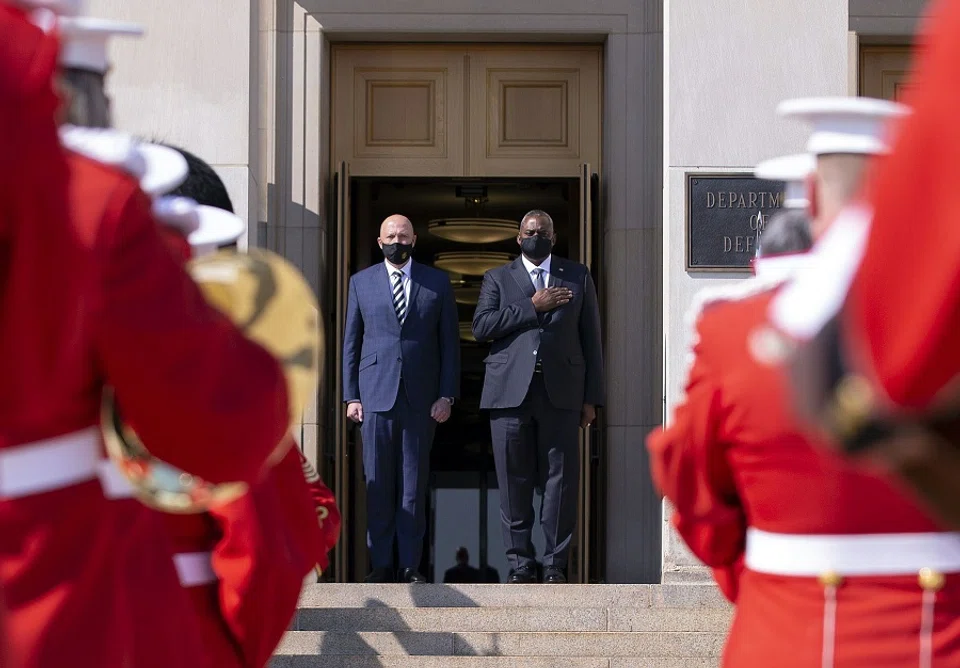With AUKUS in place, now what for key players in the Indo-Pacific?
Former German diplomat Dr Anne-Marie Schleich analyses the impact of AUKUS from the perspective of key players in the region. This development sees important ramifications, not only for Australia, which has further thrown in its lot with the US, but for other stakeholders such as the Pacific island countries, who may see their nuclear-free Blue Pacific blueprint thwarted, as well as the European countries, who must decide how they can maintain a strategic presence in the region within the AUKUS framework.

The 15 September announcement of AUKUS, a trilateral security partnership between the US, the UK and Australia, signalled a dramatic shift in Asia's geopolitical balance of power. The pact will strengthen information and technology sharing as well as the "integration of security-related science, technology, industrial bases and supply chains" between the three countries.
The first initiative of AUKUS was Australia's new deal with the US and the UK for eight nuclear-powered submarines armed with US defence missiles. The announcement was accompanied by Australia's abrupt cancellation of a five-year-old US$66 billion contract for twelve conventionally powered submarines with France's Naval Group, a move that caused enormous anger in France. Both initiatives set off a cascade of assessments of their probable ramifications. AUKUS may create more ripple effects in the region than originally anticipated.
Firm US strategic positioning in the Asia-Pacific
The move to form a trilateral pact follows the US government's decision to identify China as the biggest strategic and military threat and systemic challenge which needs to be addressed with the greatest urgency. This view is shared by both parties in the US and by the American public and most of the media in the US.
After years of half-hearted declarations of a pivot to Asia under the Obama administration, the new partnership AUKUS reflects a firm US strategic positioning in the Asia-Pacific joined by two strong traditional partners. AUKUS is complemented by two overlapping partnership arrangements: the revived Quad cooperation between Japan, India the US and Australia and the Five Eyes alliance (US, UK, Canada, Australia and New Zealand). The Five Eyes partners have become more vocal in the last two years as they issued strong statements against China.

One can expect that the Biden administration will try to rebuild the relationship with France. It needs to take France, a European as well as Pacific power, onboard again to line up support from important Western democracies. The US doesn't want the China topic to divide the US and the Europeans.
Australia: from a defensive to a deterrent force
Australia made a pragmatic but not so unexpected decision in choosing the US as the best partner for its security needs. There were five reasons for it to join AUKUS: (1) a historically close military and security relationship with the US; (2) a shared belief system that democracies need to safeguard a Free and Open Pacific; (3) the fact that all Australian parties and the electorate perceive China as a threat; (4) Australia's mounting unhappiness about exploding contract costs and insufficient local job creation by the French contractor: and (5) a resilient Australian economy which diversified its export market after recent Chinese tariffs and bans on its export goods.
Australia has been a vital ally of the US for a long time. The two countries fought side by side in the various wars since WWI and WWII in Europe, the Pacific, Korea, the Middle East and in Afghanistan. The 1951 ANZUS treaty between the US, Australia and New Zealand is the foundation for the US military presence in the Pacific Ocean. Since 2005, the US and Australia have held joint biennial military exercises, the last one in July 2021. In 2014, the two countries signed a Force Posture Agreement, which paved the way for increased US aircraft rotations in Australia and for US Marines to be permanently deployed in Darwin. These rotations and tripartite military interoperability will be increased under AUKUS.
The 2017 Foreign Policy White Paper already warned of growing instability in the region and called for closer ties with its regional partners. A policy shift was already foreshadowed in the Australian "2020 Defence Strategic Update" in July 2020 which marked a shift of Australia's defence policy from a historically defensive force to a deterrent force, ready to lead operations in Australia's neighbourhood. The report underlined the importance of building defence relationships and security links with partners while PM Morrison emphasised that Australia faces its "most consequential strategic realignment since the Second World War". As a consequence, his government will increase defence spending to 2% of GDP.
With energy prices skyrocketing and increased international coal shortages, the Australian government calculated that it could weather any economic fallout from China in the aftermath of AUKUS.

Since 2020, Australia and China have been embroiled in escalating trade and diplomatic disputes. The seesawing conflict started in 2018, when Australia barred Huawei from providing 5G network services. It continued in February 2020, when Australia initiated anti-dumping duties on various Chinese steel and aluminium products. In April 2020, Australia pushed for an international inquiry into the origins of the coronavirus. China retaliated with import suspensions or higher tariffs on a number of Australian import goods.
In spite of this, the Australian economy achieved a record surplus in 2020 of A$75 billion (2019: A$68 billion). Australian exporters diversified their exports across the Asia Pacific, the EU and the UK. Australian exports to China stood at 30.7% of total exports in 2020 and only dipped 2.6%, much less than its exports to the US (-10%). With energy prices skyrocketing and increased international coal shortages, the Australian government calculated that it could weather any economic fallout from China in the aftermath of AUKUS.
New Zealand: left out in the cold?
New Zealand, which was not invited to join AUKUS, has been left out in the cold. Until AUKUS, Australia was its closest security and political partner in the Pacific with the common interest of both countries being stability at their doorstep, i.e. the South Pacific. There are three reasons why New Zealand was not been included: New Zealand's staunch independent foreign policy, its clear anti-nuclear stand dating back to the 1980s and its trade dependence on China.
It is a member of the ANZUS treaty and the Fives Eyes intelligence sharing alliance and has - like Australia - supported the US in many wars. Defence relations with the US were rebooted after a 30-year strain. It was President Obama's "pivot towards Asia" which brought New Zealand back into the US fold. The Washington Declaration signed by the US and New Zealand in 2012 provided a framework to reopen bilateral defence ties.

However, the New Zealand Labour-Greens coalition government under PM Jacinda Ardern has recently demonstrated a reluctance to sign up to some of the Five Eyes political declarations against China. She explained earlier this year that her government had raised "grave concerns" with China on human rights issues. But she also stressed that "areas of difference with China...need not define a relationship".
New Zealand's strong dependence on trade with China also made it difficult to choose between the US and China. It will be interesting to observe how AUKUS will affect strategic relations between Australia and New Zealand and the information sharing system amongst the Five Eyes.
Pacific countries such as Kiribati, the Solomon Islands and other Pacific Island Forum (PIF) countries have become politically or economically closely linked to China, some of them heavily indebted to it.
Pacific island countries: divisions ahead?
There will be AUKUS ramifications in Australia's closest neighbourhood, the Pacific island countries. Australia's nuclear-powered submarines might infringe the policy of a nuclear-free Blue Pacific, enshrined in the 1985 Treaty of Rarotonga which Australia signed.
The US and Australia consider the South Pacific as an important strategic area to safeguard its sea lanes. But China is now the biggest trading partner and the second biggest donor to the Pacific island countries. Australia is losing its traditionally dominant position in its backyard due to: (1) the Pacific island countries' growing trade with China; (2) a cut in Australia's development budget; and (3) the Australian government's unambitious carbon emissions policy.
Pacific countries such as Kiribati, the Solomon Islands and other Pacific Island Forum (PIF) countries have become politically or economically closely linked to China, some of them heavily indebted to it. The Marshall Islands and Palau are however in the US sphere of influence. The PIF already in 2019 rejected the notion that the region needed to choose between the US and China. AUKUS, with its China-containment focus, might increase divisions between Pacific island countries and Australia.
How the Europeans will respond
France in 2018, Germany and the Netherlands in 2020 have drawn up broad national Indo-Pacific strategies pointing out many fields of present and future cooperation, and all underlined their commitment to the region by sending ships there.

The publication of the EU Indo-Pacific strategy - in the making for over one year - was overshadowed by the announcement of AUKUS the day before. A common denominator of the strategies is their concern that the regional order is increasingly challenged. The strategies offer cooperation in a number of areas such as climate change and cybersecurity and expressly include China. As Josep Borell, the EU High Representative for Foreign Affairs, put it: "Cooperate whenever possible, protect whenever necessary."
And the Biden administration needs to seriously evaluate how it can take the Europeans on board.
European countries have become wary of China's long-term intentions but do not (yet) follow the tripartite AUKUS aim of strategic competition and hard power response with China. Their approach has a more inclusive character as they are convinced that many current challenges can only be solved together. This ambiguity was probably one of the reasons why France, a resident Pacific power with direct economic, political and military stakes in the Pacific, and other EU countries were left out of the trilateral pact.
The next few months will see a robust discussion and a reality check among European countries about the changed scenario. Can they maintain their balancing act or are they ready to embrace the US/UK/Australia community of values view of strategic competition with China? Together with Germany, France will be a strong voice as it will be heading the EU presidency from January 2022. And the Biden administration needs to seriously evaluate how it can take the Europeans on board.
Related: With AUKUS, Southeast Asia may become a more intense battleground | AUKUS: A reflection of ASEAN's inability to cope with China's rising assertiveness? | AUKUS: Aggravating tensions and dividing the world | The US has AUKUS. Where are China's alliances? | China will be the US's most difficult opponent | Japanese academic: US moving away from ASEAN centrality to defend its regional interests



![[Photos] Fact versus fiction: The portrayal of WWII anti-Japanese martyrs in Taiwan](https://cassette.sphdigital.com.sg/image/thinkchina/3494f8bd481870f7c65b881fd21a3fd733f573f23232376e39c532a2c7593cbc)

